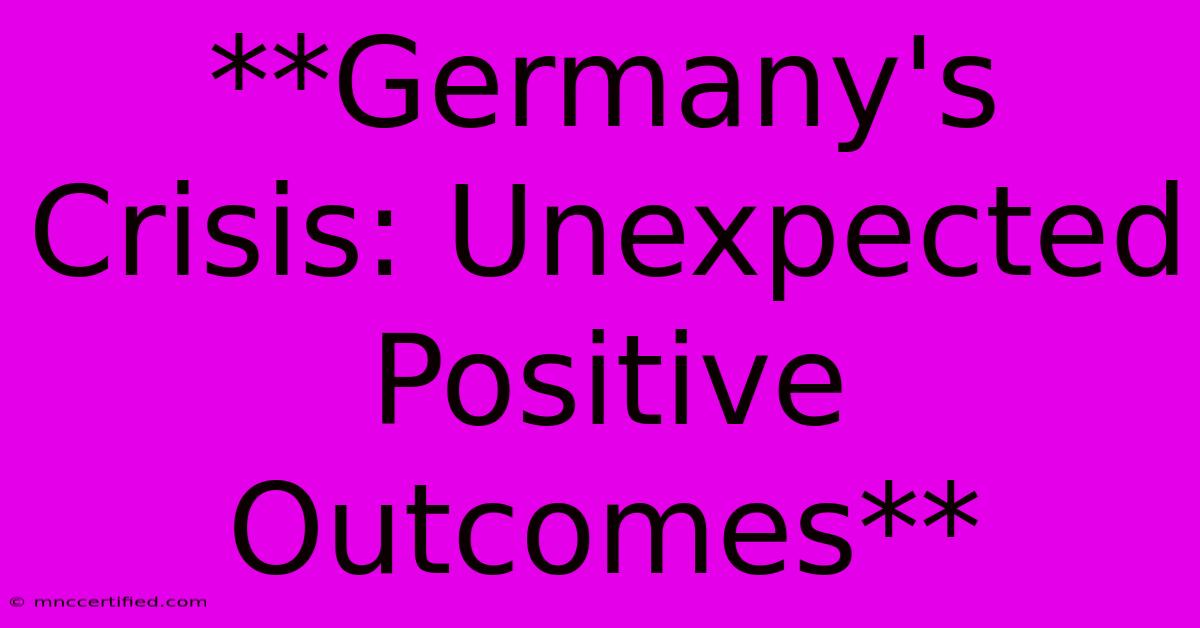**Germany's Crisis: Unexpected Positive Outcomes**

Table of Contents
Germany's Crisis: Unexpected Positive Outcomes
Germany, long known for its economic stability and engineering prowess, has been facing a series of challenges in recent years. From the COVID-19 pandemic to the ongoing energy crisis triggered by the war in Ukraine, the country has been grappling with unprecedented difficulties. However, within this period of uncertainty, there have emerged several unexpected positive outcomes. This article delves into these silver linings, examining how Germany is adapting and innovating to navigate these turbulent times.
1. A Green Energy Revolution
The energy crisis, fueled by Russia's invasion of Ukraine and the subsequent reduction of gas imports, has spurred a dramatic shift towards renewable energy sources. Germany, once heavily reliant on fossil fuels, has accelerated its transition to solar, wind, and geothermal power. This move has not only boosted energy independence but also fostered innovation in renewable energy technologies and infrastructure.
Here are some notable developments:
- Increased solar and wind energy installations: Germany has witnessed a surge in the installation of solar panels and wind turbines, significantly increasing its renewable energy capacity.
- Investment in energy storage: The need for reliable energy sources has led to investments in battery storage and other energy storage technologies to ensure a stable grid even when renewable energy sources are intermittent.
- Development of new energy solutions: Innovative technologies like green hydrogen and geothermal power are being explored and developed to further diversify Germany's energy portfolio.
This green energy revolution is not just about reducing dependence on fossil fuels but also about achieving climate goals and building a more sustainable future. While the transition comes with its own challenges, it is a crucial step towards securing Germany's energy independence and contributing to global efforts against climate change.
2. Innovation and Collaboration
The crisis has triggered a wave of innovation across various sectors. Businesses are actively seeking solutions to overcome the challenges, leading to the development of new products, services, and processes. This innovation is fueled by collaboration, as companies, research institutions, and government agencies work together to find solutions.
Here are some examples of this collaborative innovation:
- Development of new energy-efficient technologies: Companies are investing in research and development to create more energy-efficient appliances, buildings, and manufacturing processes.
- Technological advancements in the automotive sector: German car manufacturers are accelerating the development of electric vehicles and hydrogen-powered vehicles to reduce their dependence on fossil fuels.
- Creation of new business models: Companies are exploring new ways to operate, such as shared resources, circular economy models, and sustainable supply chains.
This spirit of innovation and collaboration is essential for Germany to emerge from the crisis stronger and more resilient. It showcases the country's ability to adapt to changing circumstances and seize opportunities for growth.
3. A Renewed Focus on Social Welfare
The crisis has also highlighted the importance of social welfare and the need for a robust social safety net. Germany's strong social security system has been crucial in cushioning the impact of the crisis on individuals and families.
Here are some key aspects of this focus:
- Support for vulnerable populations: Government measures have been implemented to provide financial assistance and social support to those most affected by the crisis, including low-income families, unemployed individuals, and small businesses.
- Investment in education and training: The government is investing in programs to upskill and reskill workers to adapt to the changing job market and prepare for future challenges.
- Strengthening social dialogue: The government is actively engaging with unions, businesses, and civil society organizations to develop policies that address the social and economic consequences of the crisis.
This renewed focus on social welfare is crucial for maintaining social cohesion and ensuring that the benefits of economic recovery are shared widely. It underlines the importance of building a society that prioritizes well-being and provides support to all its citizens.
4. A Shift in Global Perspective
The crisis has also led to a shift in Germany's global perspective. The country's reliance on Russian energy has underscored the need for diversifying its partnerships and strengthening its alliances with other countries.
This shift is reflected in several ways:
- Closer ties with European partners: Germany has intensified its collaboration with other European countries to strengthen the EU's energy independence and economic resilience.
- Enhanced relationships with global partners: Germany is seeking to build stronger relationships with countries like the United States and Japan to secure energy supplies and foster economic cooperation.
- A more active role in international affairs: Germany is taking a more active role in addressing global challenges, such as climate change and conflict prevention, through diplomacy and multilateral cooperation.
This shift towards a more proactive and interconnected approach to global affairs reflects Germany's understanding of the interconnectedness of the world and the need for collaborative solutions to global challenges.
Conclusion
Germany's current crisis is undoubtedly a challenging period for the country. However, it has also presented opportunities for positive change. The country is embracing renewable energy, fostering innovation, strengthening social welfare, and redefining its global role. These unexpected positive outcomes demonstrate Germany's resilience, adaptability, and commitment to building a brighter future. While challenges remain, the country's ability to adapt and innovate provides a strong foundation for navigating the uncertainties ahead and emerging stronger from this period of crisis.

Thank you for visiting our website wich cover about **Germany's Crisis: Unexpected Positive Outcomes**. We hope the information provided has been useful to you. Feel free to contact us if you have any questions or need further assistance. See you next time and dont miss to bookmark.
Featured Posts
-
Man United Wins Europa League Amad Nets Goal
Nov 08, 2024
-
Uk Interest Rates Lowered To 4 75 Live
Nov 08, 2024
-
Bidens Speech After 2024 Election Results
Nov 08, 2024
-
How To Watch Jake Paul Vs Mike Tyson Date Time
Nov 08, 2024
-
Pakistan Wins First Odi In Australia Since 2017
Nov 08, 2024